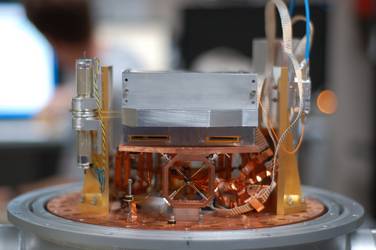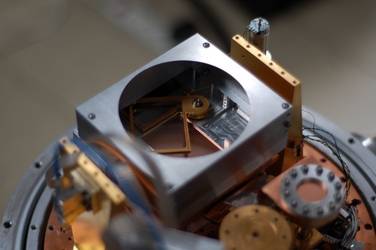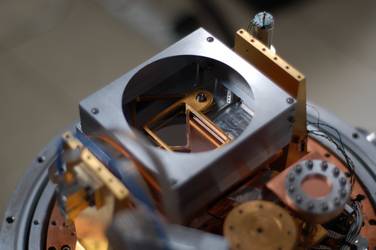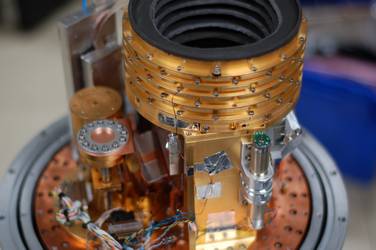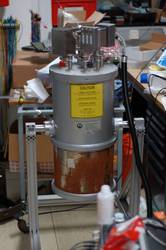|
Size: 4303
Comment:
|
Size: 6757
Comment:
|
| Deletions are marked like this. | Additions are marked like this. |
| Line 3: | Line 3: |
| This page is maintained by CK and SL | This page is maintained by CK, SL, and the GISMO team |
| Line 10: | Line 10: |
| == 3rd GISMO test run == | == 3rd GISMO test run, April 2010 == |
| Line 14: | Line 14: |
| * GSFC: J. Staguhn, D. Fixsen, A. Kovacs, S. Maher, E. Sharp, D. Benford * IRAM: S. Leclercq, A. Sievers, G. Quintana-Lacaci, R. Zylka |
* GSFC: J. Staguhn, D. Fixsen, A. Kovacs, S. Maher, E. Sharp, D. Benford * IRAM: S. Leclercq, A. Sievers, G. Quintana-Lacaci, R. Zylka |
| Line 20: | Line 20: |
| Line 23: | Line 22: |
| Lead of the run : Johannes / Samuel | Participants presence dates: [[attachment:Schedule_GISMO_visitors_April2010.pdf]] |
| Line 35: | Line 34: |
| ---- | Compilation of the lists of sources that will possibly be observed (include few references to past runs): [[attachment:GISMOtestrun3_sources.pdf]]. Comments from Johannes about the proposed science grade sources: [[attachment:IRAM_Proposed_Sources_Comments.pdf]] === GISMO upgrades compared to previous runs === * 2 motorized neutral density filters allowing to compensate the restrained dynamic range of GISMO by reducing the optical transmission in case of poor weather conditions, their transmissions are 65% and 40% respectively. * A controllable shutter and a LED coupled to detectors through a fiber allowing to make optical internal calibration * Automated observing procedures usable via a dedicated GUI such as detector tunning, sky dips, I-V measurements for total power measurements * A reduction package (Crush) allowing near-to-real-time data processing * An observer's manual of the GISMO operating software: [[attachment:GISMO_Software_Operational_Manual.pdf]] |
| Line 39: | Line 47: |
| ==== 31.03.-05.04. ==== | ==== 31.03. - 05.04. ==== |
| Line 41: | Line 49: |
| ==== 06.04. ==== | Arrival of Elmer & Stephen. Mount GISMO in the 30m workshop. The pictures below show several elements of the optical stage of GISMO: the 4K motors controlling the neutral density filters, the neutral density filters in motion, the baffle with the NDF motors and the 3He sorption cooler, and a general view of GISMO mounted. |
| Line 43: | Line 51: |
| Arrival of Johannes, Dale, Attila, Samuel. GISMO is already cold. Turn on the instrument, BIAS the SQUIDs, monitor the TESs responses, take IV curves: all 4 quadrants are working, few dead pixels (due to the MUX). Problem with the internal LED. Instal the GISMO frame in th cabin, but keep everything else (GISMO & electronics) in the workshop. | ||{{attachment:GISMO_4K_NDfilters_motors.jpg}} {{attachment:GISMO_NDfilter_1_moves.jpg}} {{attachment:GISMO_NDfilter_2_moves.jpg}} {{attachment:GISMO_baffle_3He_cooler.jpg}} {{attachment:GISMO_mounted.jpg}}|| Start cooling down on the 05.04. ==== 06.04. & 07.04. ==== Arrival of Johannes, Dale, Attila, and Samuel. GISMO is cold. Turn on the instrument, BIAS the SQUIDs, monitor the TESs responses, take IV curves: all 4 quadrants are working, about ~20 non-responsive pixels (mostly due to SQUID issues in the MUX). LED illumination not visible in the real time data, but appears finely in reduced curves. Problems of strange wiggles in the IV curves. Install the GISMO frame in the cabin, but keep everything else (GISMO & electronics) in the workshop. Find next morning that the problem with the IV curves was surely due to CPU overheating. A new power supply (with large fan) was installed and an external heat source (another computer) was removed. Subsequently things looks fine, frequency plots show 1/f^2 noise certainly due to thermal oscillations. |
| Line 47: | Line 64: |
| == 2nd GISMO Test run == | == 2nd GISMO Test run, October 2008 == |
| Line 59: | Line 76: |
| * [[attachment:Report_on_GISMO_Run2_Rev3.pdf]] * [[attachment:Atmospheric_Emission_Noise_at_Pico_Veleta.pdf]] * [[attachment:GISMO_run2_reply_to_J_Staguhn.pdf]] * [[attachment:GISMO_sensitivity_reply_to_D_Benford.pdf]] * [[attachment:Some_GISMO_reduced_images.pdf]] * [[http://www.submm.caltech.edu/~sharc/crush/index.htm|Crush]] ---- == 1st GISMO Test run, November 2007 == |
|
| Line 65: | Line 93: |
| * [[http://www.submm.caltech.edu/~sharc/crush/index.htm|Crush]] |
GISMO - The Goddard-IRAM Superconducting 2 Millimeter Observer
This page is maintained by CK, SL, and the GISMO team
3rd GISMO test run, April 2010
Staffing of the test run
- GSFC: J. Staguhn, D. Fixsen, A. Kovacs, S. Maher, E. Sharp, D. Benford
- IRAM: S. Leclercq, A. Sievers, G. Quintana-Lacaci, R. Zylka
Test run schedule: 31.03. - 16.04.2010
IRAM 30m schedule page: Schedule T16-09 in 30m schedule = GISMO has telescope time
Participants presence dates: Schedule_GISMO_visitors_April2010.pdf
# |
Dates |
Main Task |
Details |
Lead (GSFC/IRAM) |
Support |
|
31.03. Wednesday |
|
Arrival of ES, first GISMO visitor, in Granada |
|
|
|
01.04.-05.04. |
Mount upgrades, close and cool down in the 30m workshop |
Arrival of SM |
|
|
|
06.04. Tuesday |
Turn on GISMO, and 1st tests in the 30m workshop |
Arrival of JS, DF, AK, SL, AS. |
Johannes / Samuel |
Albrecht (AoD) |
|
07.04.-08.04. |
Tests in the 30m workshop |
Bias, Tuning, IV curves, internal LED, Computer... |
Johannes / Samuel |
Albrecht (AoD) |
|
09.04. Friday |
Installation in the cabin, cool down, alignment, background noise |
Arrival of RZ |
Johannes / Samuel |
Albrecht & Guillermo (AoD) |
|
10.04.-12.04. |
Calibration on sky (alignment, pointing, focus, dips), observations T16-09 |
12.04.: Arrival of DB, departure of AS, SL, RZ |
Johannes / Samuel |
Guillermo (AoD) |
|
13.04.-15.04 |
Observations T16-09 |
|
Johannes |
Guillermo (AoD) |
|
16.04. Friday |
Dismounting |
Departure of everybody |
Johannes |
Guillermo (AoD) |
Compilation of the lists of sources that will possibly be observed (include few references to past runs): GISMOtestrun3_sources.pdf. Comments from Johannes about the proposed science grade sources: IRAM_Proposed_Sources_Comments.pdf
GISMO upgrades compared to previous runs
- 2 motorized neutral density filters allowing to compensate the restrained dynamic range of GISMO by reducing the optical transmission in case of poor weather conditions, their transmissions are 65% and 40% respectively.
- A controllable shutter and a LED coupled to detectors through a fiber allowing to make optical internal calibration
- Automated observing procedures usable via a dedicated GUI such as detector tunning, sky dips, I-V measurements for total power measurements
- A reduction package (Crush) allowing near-to-real-time data processing
An observer's manual of the GISMO operating software: GISMO_Software_Operational_Manual.pdf
Daily reports
31.03. - 05.04.
Arrival of Elmer & Stephen. Mount GISMO in the 30m workshop. The pictures below show several elements of the optical stage of GISMO: the 4K motors controlling the neutral density filters, the neutral density filters in motion, the baffle with the NDF motors and the 3He sorption cooler, and a general view of GISMO mounted.
Start cooling down on the 05.04.
06.04. & 07.04.
Arrival of Johannes, Dale, Attila, and Samuel. GISMO is cold. Turn on the instrument, BIAS the SQUIDs, monitor the TESs responses, take IV curves: all 4 quadrants are working, about ~20 non-responsive pixels (mostly due to SQUID issues in the MUX). LED illumination not visible in the real time data, but appears finely in reduced curves. Problems of strange wiggles in the IV curves. Install the GISMO frame in the cabin, but keep everything else (GISMO & electronics) in the workshop. Find next morning that the problem with the IV curves was surely due to CPU overheating. A new power supply (with large fan) was installed and an external heat source (another computer) was removed. Subsequently things looks fine, frequency plots show 1/f^2 noise certainly due to thermal oscillations.
2nd GISMO Test run, October 2008
In October 2008, the GISMO team Johannes Staguhn, Stephen Maher, Elmer Sharp, Dale Fixsen, and Dominic Benford spent two weeks at the 30m observatory to first install their GISMO bolometer in the lab and then in the receiver cabin to test its performance on the sky. GISMO consists of 8x16 pixels with transition edge sensors (TES). The super conducting TES are read out by SQUID multiplexers. The nominal bandwidth is 125-175GHz, pixels are spaced by 14", the telescope HPBW is 17" at 2mm. Data are taken while the telescope is performing Lissajous scan patterns, without switching the secondary, to increase the mapping efficiency. An automated pipeline merges the GISMO data with the telescope data streams to create FITS files, being triggered by the IRAM messaging system. Data are then further reduced using the Goddard data reduction package.
The 2mm spectral range provides a unique terrestrial window enabling ground-based observations of the earliest active dusty galaxies in the universe and thereby allowing a better constraint on the star formation rate in these objects. Preliminary results from this second observing run at the 30m telescope look very promising.
(CK, 28-Oct-2008)
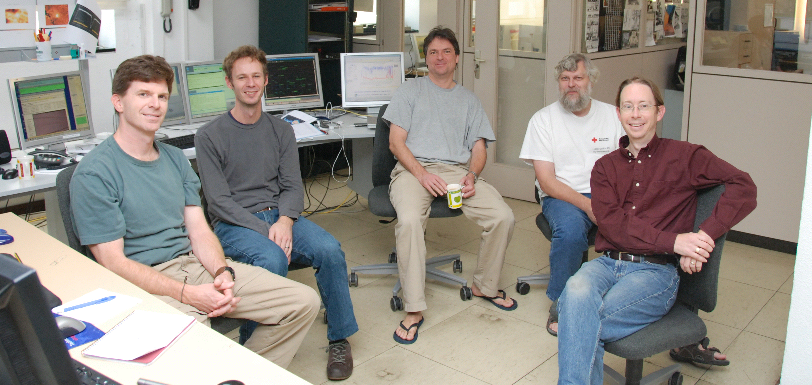
The GISMO team in the control room at the 30m telescope, after one week of 24 hours observing time. From left to right: Stephen Maher, Elmer Sharp, Johannes Staguhn, Dale Fixsen, Dominic Benford (Photo by A.Sievers on October, 27, 2008)
1st GISMO Test run, November 2007
Staguhn et al. 2008 GISMO, a 2 mm Bolometer Camera Optimized for the Study of High Redshift Galaxies

